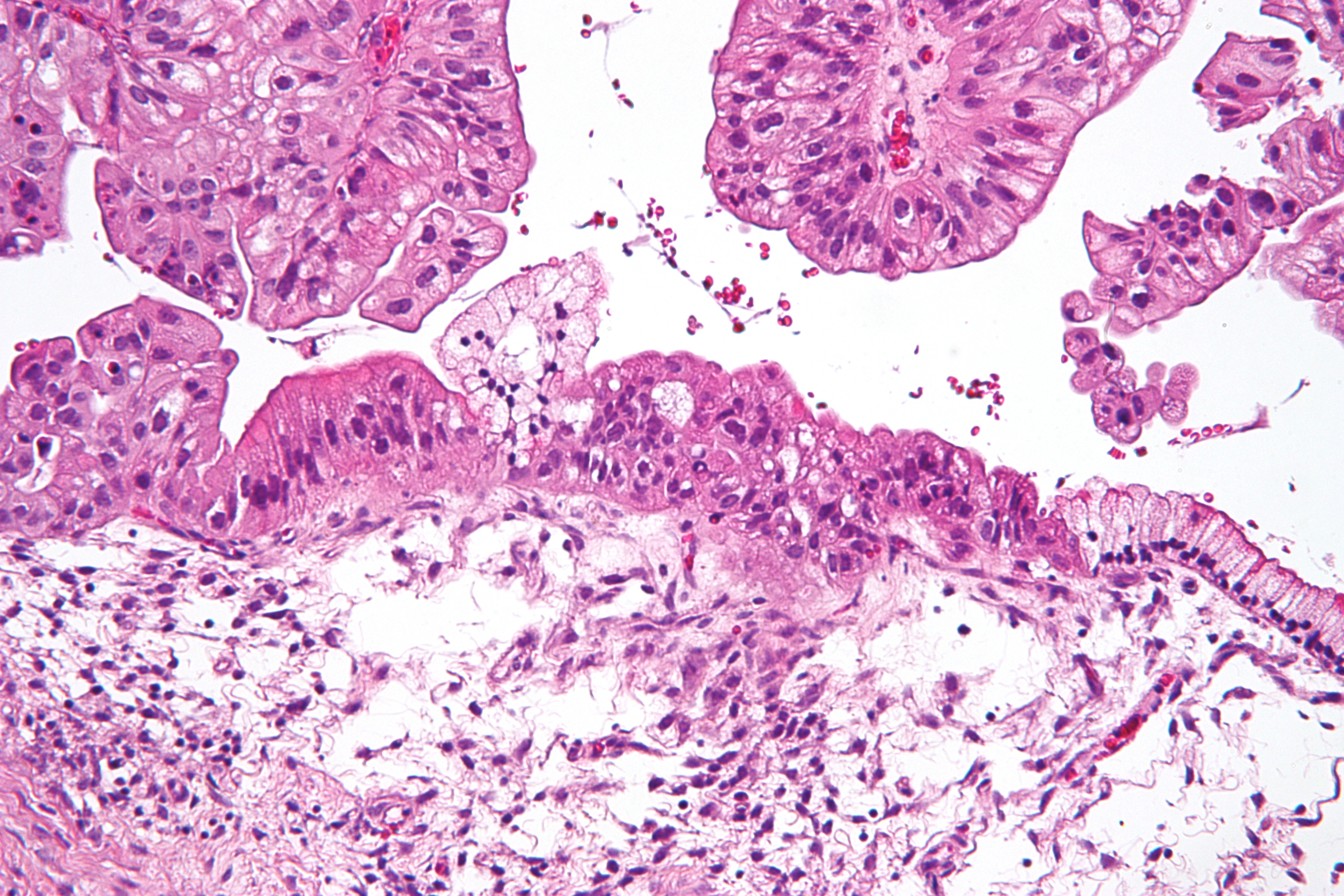Cystadenocarcinoma
Editor-In-Chief: Prab R Tumpati, MD
Obesity, Sleep & Internal medicine
Founder, WikiMD Wellnesspedia &
W8MD medical weight loss NYC and sleep center NYC
| Cystadenocarcinoma | |
|---|---|

| |
| Synonyms | |
| Pronounce | N/A |
| Specialty | N/A |
| Symptoms | Abdominal pain, bloating, weight loss, fatigue |
| Complications | Metastasis, ascites, bowel obstruction |
| Onset | |
| Duration | |
| Types | Serous cystadenocarcinoma, Mucinous cystadenocarcinoma |
| Causes | |
| Risks | Family history, genetic mutations (e.g., BRCA1, BRCA2) |
| Diagnosis | Imaging studies, biopsy |
| Differential diagnosis | Benign cystadenoma, endometriosis, ovarian cancer |
| Prevention | |
| Treatment | Surgery, chemotherapy, radiation therapy |
| Medication | |
| Prognosis | |
| Frequency | |
| Deaths | |
Cystadenocarcinoma is a type of cancer that originates from glandular tissues and is characterized by the presence of cysts. It can occur in various parts of the body but is most commonly found in the ovary (ovarian cystadenocarcinoma) and the pancreas (pancreatic cystadenocarcinoma). This malignancy varies in its degree of aggressiveness, depending on the site of origin and the specific histological subtype.
Etiology and Pathogenesis[edit | edit source]
The exact cause of cystadenocarcinoma remains largely unknown. However, several risk factors have been identified, including genetic predisposition, age, and, in some cases, a history of specific types of benign cysts transforming into malignant cystadenocarcinoma. For ovarian cystadenocarcinoma, factors such as family history of ovarian cancer, mutations in the BRCA1 and BRCA2 genes, and infertility or the use of fertility drugs have been associated with an increased risk.
Symptoms[edit | edit source]
Symptoms of cystadenocarcinoma vary depending on the tumor's location. Common symptoms include abdominal pain, bloating, a palpable mass in the abdomen, and changes in bowel or bladder habits. In advanced stages, weight loss, anemia, and fatigue may also be present.
Diagnosis[edit | edit source]
Diagnosis of cystadenocarcinoma involves a combination of clinical evaluation, imaging studies such as ultrasound, CT scan, and MRI, and histological examination of tissue samples obtained through biopsy. Blood tests, including tumor markers, may also aid in the diagnosis and monitoring of the disease.
Treatment[edit | edit source]
Treatment options for cystadenocarcinoma depend on the stage of the disease, the patient's overall health, and the tumor's location. Surgery is the primary treatment modality, aiming to remove the tumor and any involved tissues or organs. In some cases, chemotherapy and radiation therapy may be used as adjunctive treatments to address residual disease or metastases.
Prognosis[edit | edit source]
The prognosis for cystadenocarcinoma varies widely based on the tumor's type, size, location, and stage at diagnosis. Early detection and treatment significantly improve outcomes. However, advanced cystadenocarcinomas, especially those that have metastasized, have a poorer prognosis.
Prevention[edit | edit source]
Preventive measures for cystadenocarcinoma are limited. For individuals with a high genetic risk, such as those with BRCA mutations, prophylactic surgery to remove at-risk tissues may be considered. Regular screening and monitoring for people at high risk can also aid in early detection.
Search WikiMD
Ad.Tired of being Overweight? Try W8MD's physician weight loss program.
Semaglutide (Ozempic / Wegovy and Tirzepatide (Mounjaro / Zepbound) available.
Advertise on WikiMD
|
WikiMD's Wellness Encyclopedia |
| Let Food Be Thy Medicine Medicine Thy Food - Hippocrates |
Translate this page: - East Asian
中文,
日本,
한국어,
South Asian
हिन्दी,
தமிழ்,
తెలుగు,
Urdu,
ಕನ್ನಡ,
Southeast Asian
Indonesian,
Vietnamese,
Thai,
မြန်မာဘာသာ,
বাংলা
European
español,
Deutsch,
français,
Greek,
português do Brasil,
polski,
română,
русский,
Nederlands,
norsk,
svenska,
suomi,
Italian
Middle Eastern & African
عربى,
Turkish,
Persian,
Hebrew,
Afrikaans,
isiZulu,
Kiswahili,
Other
Bulgarian,
Hungarian,
Czech,
Swedish,
മലയാളം,
मराठी,
ਪੰਜਾਬੀ,
ગુજરાતી,
Portuguese,
Ukrainian
Medical Disclaimer: WikiMD is not a substitute for professional medical advice. The information on WikiMD is provided as an information resource only, may be incorrect, outdated or misleading, and is not to be used or relied on for any diagnostic or treatment purposes. Please consult your health care provider before making any healthcare decisions or for guidance about a specific medical condition. WikiMD expressly disclaims responsibility, and shall have no liability, for any damages, loss, injury, or liability whatsoever suffered as a result of your reliance on the information contained in this site. By visiting this site you agree to the foregoing terms and conditions, which may from time to time be changed or supplemented by WikiMD. If you do not agree to the foregoing terms and conditions, you should not enter or use this site. See full disclaimer.
Credits:Most images are courtesy of Wikimedia commons, and templates, categories Wikipedia, licensed under CC BY SA or similar.
Contributors: Prab R. Tumpati, MD

